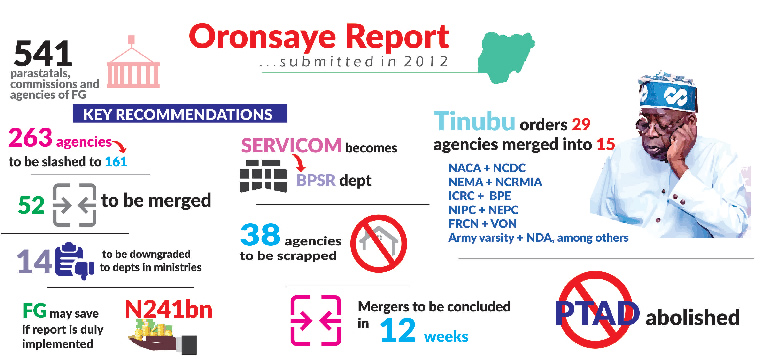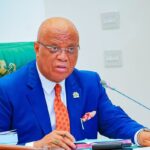President Bola Ahmed Tinubu has directed full implementation of the Oronsaye report on public sector reform submitted in 2012, to President Goodluck Jonathan. Addressing journalists after last Monday’s Federal Executive Council meeting, the Minister of Information and National Orientation, Mohammed Idris, said many agencies would be scrapped, some merged, while others will be subsumed as departments or units in various ministries. According to the minister, the decision is to “fine-tune and to restructure government operations as a whole…and to reduce the cost of governance, because some of these agencies are performing very similar functions; so the government thought it wise that there is the need – since this committee had already been set up, white paper already produced – to take a bold decision to visit that.”
In her remarks, Special Adviser to the president on Policy Coordination, Hadiza Bala Usman, said agencies affected include the National Agency for Control of HIV/AIDS to be merged with the National Centre for Disease Control in the Federal Ministry of Health. The National Emergency Management Agency is to be merged with the National Commission for Refugees, Migration and Internally Displaced Persons; the Directorate of Technical Cooperation in Africa is to be merged with the Directorate of Technical Aid and to function as a department in the Ministry of Foreign Affairs. The Infrastructure Concession Regulatory Commission will be merged with the Bureau for Public Enterprises; the Nigerian Investment Promotion Commission to be integrated into the Nigerian Export Promotion Council, while the National Agency for Science and Engineering Infrastructure will be merged with the National Centre for Agriculture Mechanisation and Project Development Institute. Also, the National Biotechnology Development Agency will be merged with the National Centre for Genetic Resource and Biotechnology, the National Institute for Leather Science Technology with the National Institute for Chemical Technology and the Nomadic Education Commission with the National Commission for Mass Literacy, Adult Education and Non-Formal Education. The Federal Radio Corporation will be merged with the Voice of Nigeria; the National Commission for Museum and Monuments with the National Gallery of Arts; the National Theatre with the National Troupe of Nigeria and the National Metrological Development Centre with the National Metrological Training Institute.
Also, the Nigerian Army University, Biu, Borno State, and the Air Force Institute of Technology will become faculties of the Nigerian Defence Academy. The Service Compact with Nigeria, otherwise known as SERVICOM, will become a department under the Bureau for Public Service Reform; the Border Communities Development Agency becomes a department at the National Boundary Commission while the National Salaries, Income and Wages Commission will be subsumed into the Revenue Mobilisation, Allocation and Fiscal Allocation Commission. The Institute for Peace and Conflict Resolution will become part of the Institute for International Affairs; the Public Complaints Commission to be subsumed under the National Human Rights Commission; the Nigerian Institute for Trypanosomiasis into the Institute for Veterinary Research; the National Medicine Development Agency under the National Institute for Pharmaceutical Research and Development and the National Intelligence Agency Pension Commission under the Nigerian Pension Commission.
Ms Bala Usman added that the Niger Delta Power Holding Company has been relocated to the Ministry of Power; the National Agricultural Land Development Agency to the Federal Ministry of Agriculture and Food Security; the National Blood Service Commission has been converted into an agency and relocated to the Federal Ministry of Health while the Nigerian Diaspora Commission becomes an agency at the Federal Ministry of Finance.
- Column No.6: Abduction nation: Who will pay Nigeria’s ransom?
- Oronsaye Report: Don’t merge or scrap PRODA, Ohanaeze youths tell Tinubu
She also announced that President Tinubu has constituted a committee “to proceed and ensure all of these are done within a period of 12 weeks. The committee membership comprises the Secretary to the Government of Federation, who will chair the committee; the Head of Civil Service of the Federation, member; the Attorney-General of the Federation and Minister of Justice, member; the Honourable Minister of Budget and National Planning, member; the Director-General, Bureau of Public Service Reform, member; the Special Adviser to the President on Policy and Coordination is a member; the two Senior Special Assistants to the President on National Assembly are members; and the Cabinet Affairs Office will serve as secretariat.”
We, at Daily Trust, wholeheartedly support this effort to reduce the cost of governance and enhance the efficiency of public agencies. However, we join the House of Representatives in cautioning the president to thoroughly review the report before rushing to implement it. As rightly pointed out in a motion of urgent public importance sponsored by Representatives Kama Nkemkanma, Olumide Osoba and Jonathan Gaza Gbefwi, the full implementation of the report “12 years after it was first made may be described as outdated, especially because of how dynamic the society, economy, polity, technology and all facets of our national life has been.”
Nkemkanma, in his lead debate, recalled that the White Paper Committee set up by Jonathan’s administration had rejected most of the recommendations in the Oronsaye Report, “while those accepted were not implemented. In November 2021, President Muhammadu Buhari’s administration inaugurated two committees; one headed by Goni Aji, a retired Head of Civil Service of the Federation, was to review the Oronsaye Report and the second, chaired by Ama Pepple, also a retired Head of the Civil Service of the Federation, was constituted to review agencies created between 2014 and 2021”.
He said upon the submission of the reports, Buhari’s administration, in July 2022, set up another committee chaired by Ebele Okeke, a former Head of the Civil Service of the Federation, to produce a White Paper on the reports. And, “Contrary to the assumption that the full implementation of the report would reduce cost of governance, with the current realities, the full implementation of the report will not substantially reduce the cost of governance as it does not reflect the current situation in the public service of the federation.” He also said the full implementation of 2012 Oronsaye report in 2024 “will certainly throw up unintended consequences, implications and outcomes.”
It must be stated that the 12-week period approved by the Federal Executive Council for implementing the Oronsaye report is too short a time for a thorough review in view of prevailing circumstances as well as the creation of several agencies after the presentation of the Oronsaye report. We also caution that the exercise should be guided solely by economic rather than political considerations as already, reports have started surfacing about jostling by heads of parastatals slated for scrapping or merger to be exempted or given vantage positions in the merger. A case in point is the public tussle between the proponents of the Public Service Institute of Nigeria, Dutse Alhaji, Abuja and those of the Administrative Staff College of Nigeria, ASCON, Badagry, over which agency should be subsumed under which. Political connections of the present heads of agencies should not be the yardstick in fusing the organisations but a clear headed assessment of their functions.
Moreover, we call on the Tinubu administration to see the implementation of the Oronsaye report after a thorough review, as a first step in the nation’s quest to cut profligacy in governance. This administration has the highest number of ministers since the beginning of the fourth republic in 1999. Mr. President should, therefore, go beyond the civil service and cut down on number of ministers to reduce the burden of political appointees on the government’s treasury. Apart from merging and scrapping of ministries, departments and agencies, the president should slash the perks of office currently being enjoyed by elected and appointed politicians to boost citizen’s confidence that this government means business. Furthermore, the government should actively work to plug all leakages in the system that lead to the waste of our collective resources in servicing the needs of a select few who are supposed to dedicate themselves to serving the majority.

 Join Daily Trust WhatsApp Community For Quick Access To News and Happenings Around You.
Join Daily Trust WhatsApp Community For Quick Access To News and Happenings Around You.


